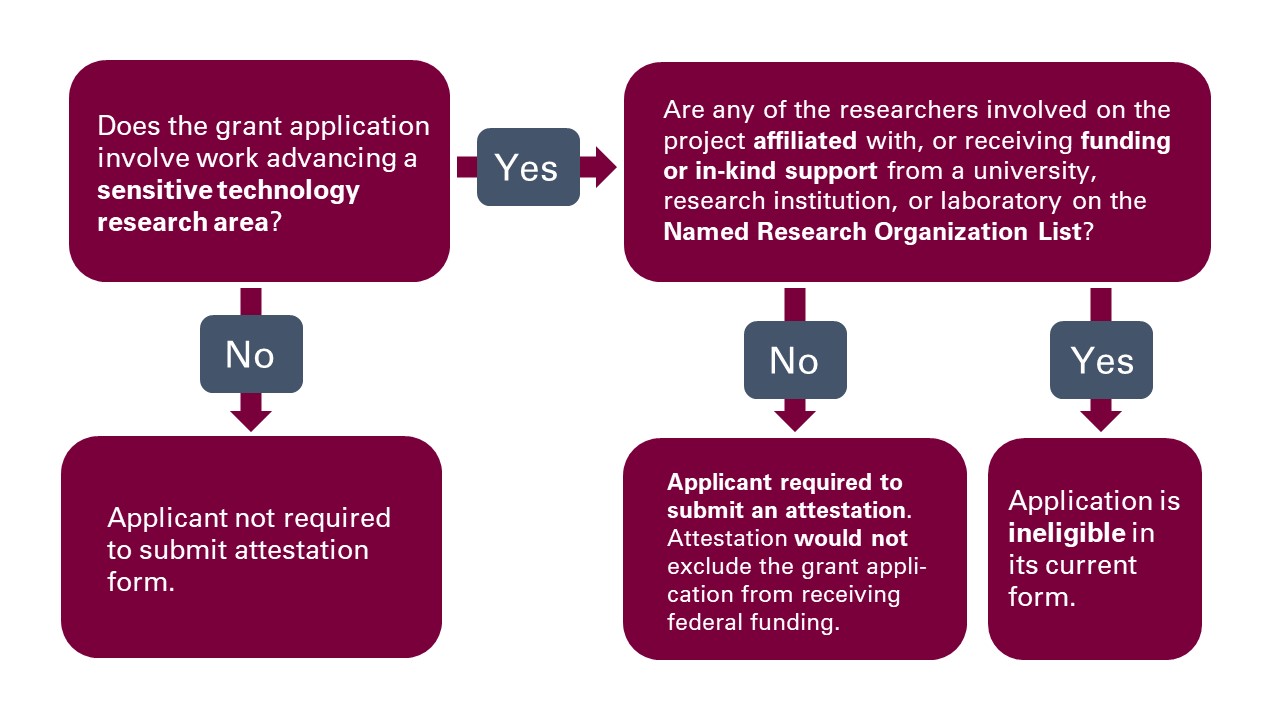Policy on Sensitive Technology Research and Affiliations of Concern (STRAC)
On January 16th, 2024, the Honourable François-Philippe Champagne, Minister of Innovation, Science and Industry, the Honourable Mark Holland, Minister of Health, and the Honourable Dominic LeBlanc, Minister of Public Safety, Democratic Institutions and Intergovernmental Affairs announced the Sensitive Technology Research and Affiliations of Concern (STRAC) policy.
The STRAC policy – designed to protect Canada’s research ecosystem from foreign influence by research institutions connected to military, national defence, or state security entities – includes a list of 11 sensitive technology research areas (STRA), such as AI, quantum computing and genetic engineering, and a list of 103 named research organizations (NRO), and applies to all grant applications submitted to federal agencies (CIHR, NSERC, SSHRC) and the Canadian Foundation for Innovation (CFI).
Implications for Researchers and Institutions
The STRAC policy will be effective May 1, 2024.
Affiliations: This policy applies to current and ongoing affiliations with the listed institutions. Past affiliations, for example, a researcher who previously obtained an undergraduate degree from an NRO but is no longer affiliated with it, will fall outside the scope of the policy.
Attestations: For grant applications where the proposed research will advance a sensitive technology research area, all researchers named on the grant must provide an individual attestation indicating they are not affiliated with, or in receipt of funding or in-kind support, from any of the listed institutions. If a research team member has an active affiliation, they are required to formally end the affiliation in order to be eligible to apply for a federal grant. Efforts made to end an affiliation should be documented and retained by the individual for future reference.
Compliance: The Principal Investigator (PI) is responsible for collecting and submitting attestations to the research office with the grant application. As well, PIs are expected to consult with the VPR’s Office and communicate any material changes to the project to ensure continued compliance throughout the duration of the project. Individuals involved in activities supported by the grant, but are not a named researcher on the original grant proposal, are expected to be in compliance with the policy but are not required to sign an attestation.
Process & Compliance
This policy applies to all grant applications submitted through a university or an affiliated research institution to the three federal granting agencies and the Canada Foundation for Innovation (CFI).
Grant applications must undergo a two-step process prior to applying for a federal grant:

Policy details provided by: Innovation, Science and Economic Development (ISED), Government of Canada.
Things to Consider
Researchers currently preparing grant applications, or who intend to in the future, should:
- Determine if their area of research falls within one of the 11 sensitive research areas;
- Consider all members of the research team and work with them to determine if there are any current affiliations with any of the NROs;
- If applicable, retain documentation of all efforts made to sever affiliations with a listed institution.
How Does STRAC Align with National Security Guidelines for Research Partnerships (NSGRP)?
The majority of grant applications submitted prior to May 1st will not be within the scope of this policy. However, the policy states the Government of Canada may take research affiliations into account immediately as part of the research funding decision-making process, should risks be identified. Research affiliations will be considered as part of the national security assessment of any research grant applications that are subject to the National Security Guidelines for Research Partnerships (NSGRP) such as NSERC Alliance and CBRF-BRIF.
STRAC policy is distinct, but complementary to the NSGRP risk assessment form. If applying for a grant where the research is identified as advancing a listed sensitive technology research area, or if the partner has an affiliation with a named research organization, this should be captured with a yes (or unsure) response to questions 1.6 and 2.3, respectively. The nature of the risk should then be explained in the Risk Identified section and mitigated in the Risk Mitigation Plan.
Resources & Support
McMaster’s research administration and security teams have reviewed the STRAC policy and continue to assess the impacts it has, and will have, on the McMaster community. We will continue to consult with our academic and government partners to determine best practices and mitigation strategies. We will continue to communicate important updates as the government releases further guidance on the implementation of this policy. If you have immediate questions about how the policy affects your research program, please contact our research security team.
The research security webpage will also be updated with details of information sessions and workshops on the policy, and on research security in general.


